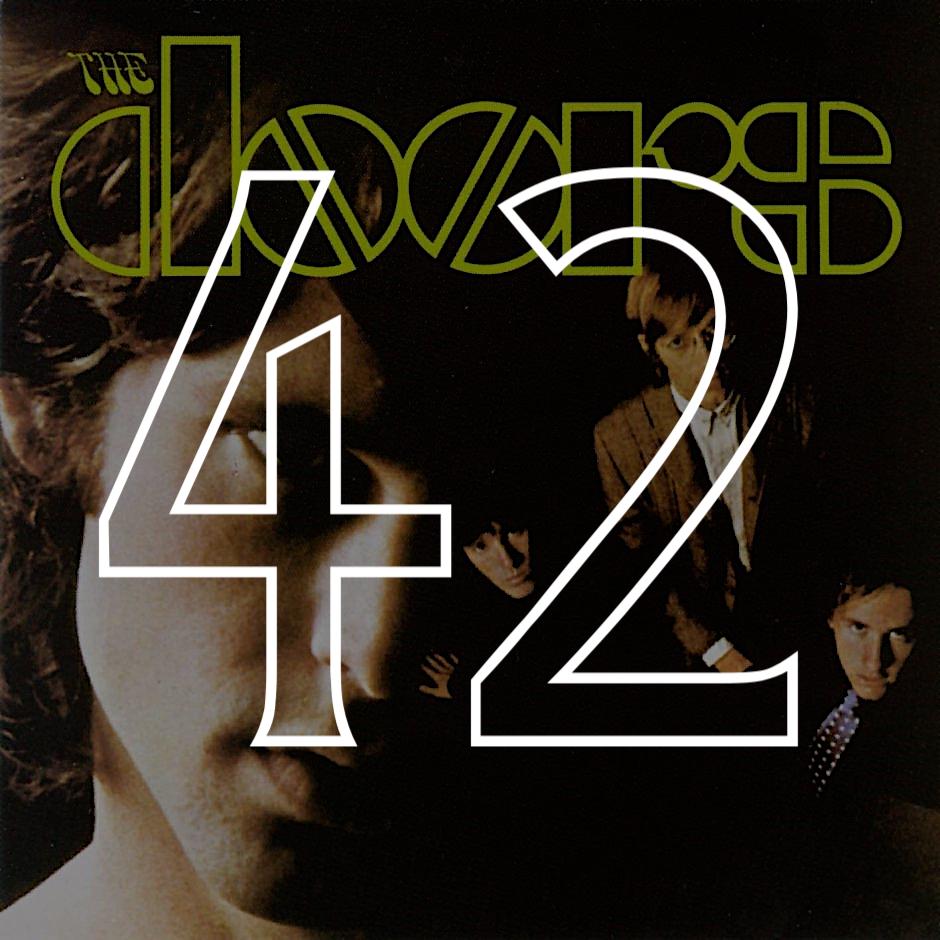#42: The Doors, "The Doors" (1967)
I know almost all the words to the Doors’ self-titled album, which sounds marginally impressive until you listen to it and realize just how few distinct lyrics its songs contain.
In my mid-twenties, one of my exes—a musician himself, whose lanky torso reminded me of the ubiquitous shirtless Morrison poster—proclaimed that a key stage in growing up is admitting that the Doors are not as good as we believed them to be in high school. I laughed too hard when he said it. Sometimes I worry that I imprinted on Jim Morrison like some type of sexualized duckling and that he is responsible for my taste in men: long-haired, beautiful rather than handsome, and junkie-thin.
The contemporary notion that the Doors are overrated is not uncommon, and I suspect the idea has something to do with the fans. See the 2015 open letter in McSweeney’s to seventeen-year-old white boys who just discovered the Doors. The letter’s author digs at Morrison’s self-centeredness, what he calls “masturbatory self-aggrandizement,” attributing the same tendencies to that particular demographic of the band’s admirers. I’m not saying he’s wrong.
Though I was never a seventeen-year-old white boy, I went through the predictable phase that’s a hodgepodge of Beat Poets, ‘60s music, Gonzo Journalism, cursory Buddhism, and drugs. It started when I was about fifteen (right on schedule, according to that letter) and since I’m just now coming out with my first book of essays, I wonder if it’s ever truly ended.
The initial appeal of the Doors, Jim Morrison himself aside, was the broad applicability of their lyrics, those stoned, profound-seeming statements that were vague enough that I could imagine they meant whatever I wanted them to. For instance, from the titular track of The Soft Parade:
When I was back there in seminary school
there was a person there who put forth the proposition
that you can petition the lord with prayer.
Morrison repeats, three times, more incredulously each time:
Petition the lord with prayer.
Then he screams:
You cannot petition the lord with prayer.
I have never met a teenager who did not wish with all her might for something, who did not afterward feel like all her wishes were for nothing.
Part of the issue with not being a seventeen-year-old white boy while still liking these things meant that the fallout for being a moody, promiscuous, strung-out adolescent was intense—in all likelihood, more severe for it. I’m mostly not bitter about it anymore, but I have to be in a particular mood to listen to the Doors these days. It’s music for when the sunlight feels like warm syrup, regardless of the temperature outside. It’s music for lying sideways across the bed for no particular reason or riding in the passenger seat of a car with your hand out in the window feeling the currents in the air.
Truthfully, the songs from The Doors I most enjoy now are the ones I initially ignored: “I Looked at You” and “Take it as it Comes.” Perhaps this is because there’s still a modicum of surprise left in the neural pathways when they fire along these melodies; perhaps it’s because I’m now more interested in being happy than in little girls and whiskey bars. But I still love the album because when I listen to it I remember how it felt to be fifteen, both the good and the bad.
The Doors songs that are about love but not betrayal are endlessly hopeful. It’s the kind of love that’s chemically-induced, that does not have time or perspective or scope to hold it down. “Light My Fire” in its album version is a full seven minutes and ten seconds. The Doors love is the kind of love that burns bright and then burns out or changes to something more sustainable, but is so goddamn beautiful while it lasts:
I’m gonna love you till the heavens stop the rain
I’m gonna love you till the stars fall from the sky
For you and I
Now I am thirty, and I currently live with a man who has gorgeous hair. I am forever trying to convince him to grow it out. The curls hang over his face like a dream. In some ways, we never grow up.
—Alysia Sawchyn

